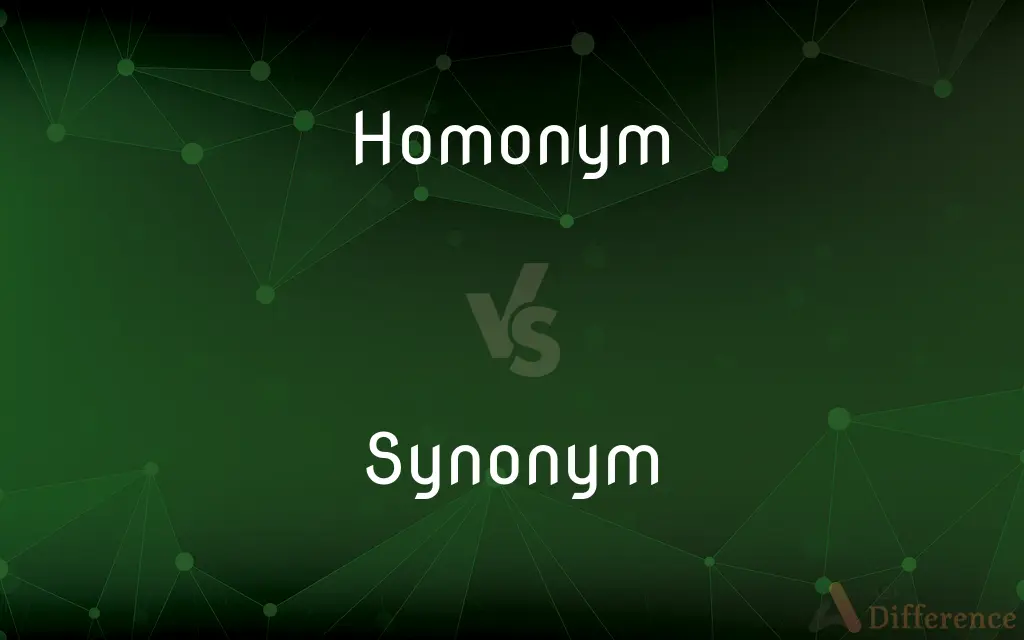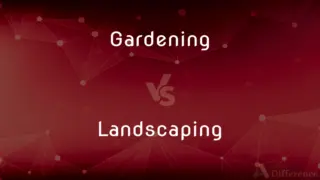Homonym vs. Synonym — What's the Difference?
By Tayyaba Rehman & Maham Liaqat — Updated on April 3, 2024
Homonyms are words that sound alike but have different meanings, while synonyms are different words with similar meanings.

Difference Between Homonym and Synonym
Table of Contents
ADVERTISEMENT
Key Differences
Homonyms, including both homophones (words that sound alike but have different spellings and meanings, like "to," "too," and "two") and homographs (words spelled the same but with different pronunciations and meanings, like "lead" as a verb and "lead" as a noun), play a crucial role in the complexity of language by adding layers of meaning and nuance. They often arise naturally over time as languages evolve, leading to words that can cause confusion in both spoken and written forms if not contextualized properly. On the other hand, synonyms are words from the same language that share very similar meanings but are different in form and often in nuance, such as "big" and "large." They enrich language by providing options to express ideas with subtle variations in tone, connotation, and style, making it possible to convey messages more precisely or artistically.
The primary function of homonyms is to add lexical diversity to language, making it possible for a single word or sound to carry multiple meanings. This can enhance poetic and rhetorical expressions by allowing for wordplay, puns, and double entendres. In contrast, synonyms serve to expand the vocabulary available for expressing particular ideas or emotions, enabling speakers and writers to choose words that best fit the context, tone, and intent of their message.
Homonyms require context for correct interpretation, as their meanings can only be discerned based on how they are used in sentences. For example, the word "bat" can mean a flying mammal or a piece of sports equipment, and understanding which meaning is intended depends entirely on the surrounding words and overall context. Synonyms, however, are generally interchangeable in many contexts, though they might carry slightly different connotations or levels of formality, such as the difference between "commence" and "begin."
In learning and using a language, homonyms can present challenges, especially for language learners, due to their potential for confusion and misinterpretation. Mastery of homonyms requires a deep understanding of context and vocabulary. Conversely, synonyms offer a way to refine language skills, providing learners and speakers with a palette of linguistic choices to express themselves more accurately and creatively.
Homonyms and synonyms also differ in their utility and application. Homonyms can create richness and depth in language through ambiguity and wordplay, often used creatively in literature, poetry, and humor. Synonyms, however, enhance clarity and precision in communication by allowing for the fine-tuning of meaning, especially useful in academic, professional, and creative writing where the exact expression of ideas is critical.
ADVERTISEMENT
Comparison Chart
Definition
Words that sound alike but have different meanings
Different words with similar meanings
Types
Homophones and homographs
N/A
Main Use
Adding lexical diversity and enabling wordplay
Providing options for precise or nuanced expression
Requirement for Understanding
Contextual clues
Knowledge of nuanced meanings
Challenges
Potential for confusion and misinterpretation
Choosing the word with the correct connotation
Utility in Language
Enhancing poetic and rhetorical expression
Enhancing clarity and precision in communication
Example
"Bark" (the sound a dog makes) vs. "bark" (part of a tree)
"Happy" and "joyful"
Compare with Definitions
Homonym
Different meanings and origins but identical pronunciation or spelling.
He went to the bank (financial institution) after paddling to the river bank (land beside a river).
Synonym
Words with similar meanings but different forms.
The quick fox jumps over the lazy dog, swiftly replacing quick with fast.
Homonym
Words that sound the same but have different meanings.
The bear (animal) can't bear (tolerate) the cold.
Synonym
Variations in tone or formality.
The job was difficult, the job was arduous, indicating a higher degree of difficulty.
Homonym
Same spelling but different meanings and pronunciations.
The wind (to turn) the clock up before the wind (air movement) blows it down.
Synonym
Enhancing creative expression.
The light was bright, the illumination was intense, adding stylistic variation.
Homonym
Sound and spelling the same but different meanings.
I like to row (propel) the boat when we row (argue).
Synonym
Avoiding repetition in text.
The teacher explained the lesson, the instructor elucidated the topic, varying the wording for interest.
Homonym
Creating ambiguity without context.
He was interested in the bats (could be flying mammals or sports equipment).
Synonym
Providing linguistic choices.
He was very happy, he was elated, offering a stronger emotional intensity.
Homonym
In linguistics, homonyms, broadly defined, are words which are homographs (words that share the same spelling, regardless of pronunciation) or homophones (words that share the same pronunciation, regardless of spelling), or both. For example, according to this definition, the words row (propel with oars), row (argument) and row (a linear arrangement) are homonyms, as are the words see (vision) and sea (body of water).
Synonym
A synonym is a word, morpheme, or phrase that means exactly or nearly the same as another word, morpheme, or phrase in the same language. For example, the words begin, start, commence, and initiate are all synonyms of one another; they are synonymous.
Homonym
Each of two or more words having the same spelling or pronunciation but different meanings and origins.
Synonym
A word or phrase that means exactly or nearly the same as another word or phrase in the same language, for example shut is a synonym of close
‘the East’ was a synonym for the Soviet empire
‘shut’ is a synonym of ‘close’
Homonym
One of two or more words that have the same sound and often the same spelling but differ in meaning, such as bank (embankment) and bank (place where money is kept).
Synonym
A word having the same or nearly the same meaning as another word or other words in a language.
Homonym
A word used to designate several different things.
Synonym
A word or expression that serves as a figurative or symbolic substitute for another
"Romeo has become a synonym for any youthful lover" (Harry Levin).
Homonym
A namesake.
Synonym
(Biology) One of two or more scientific names that have been applied to the same species or other taxonomic group.
Homonym
(Biology) A taxonomic name identical to one previously applied to a different species or other taxon and therefore unacceptable in its new use.
Synonym
A word whose meaning is the same as that of another word.
Homonym
A word that both sounds and is spelled the same as another word.
Synonym
A word or phrase with a meaning that is the same as, or very similar to, another word or phrase.
“Happy” is a synonym of “glad”.
Homonym
(loosely) A word that sounds or is spelled the same as another word (but not necessarily both), technically called a homophone (same sound, different spelling) or a homograph (same spelling, different sound), or if both are the same, a homonym.
Synonym
(zoology) Any of the formal names for a taxon, including the valid name (i.e. the senior synonym).
Homonym
(taxonomy) A name for a taxon that is identical in spelling to another name that belongs to a different taxon.
Synonym
Any name for a taxon, usually a validly published, formally accepted one, but often also an unpublished name.
Homonym
A word having the same sound as another, but differing from it in meaning; as the noun bear and the verb bear.
Synonym
(databases) An alternative (often shorter) name defined for an object in a database.
Homonym
Two words are homonyms if they are pronounced or spelled the same way but have different meanings
Synonym
One of two or more words (commonly words of the same language) which are equivalents of each other; one of two or more words which have very nearly the same signification, and therefore may often be used interchangeably. See under Synonymous.
All languages tend to clear themselves of synonyms as intellectual culture advances, the superfluous words being taken up and appropriated by new shades and combinations of thought evolved in the progress of society.
His name has thus become, throughout all civilized countries, a synonym for probity and philanthropy.
In popular literary acceptation, and as employed in special dictionaries of such words, synonyms are words sufficiently alike in general signification to be liable to be confounded, but yet so different in special definition as to require to be distinguished.
Synonym
An incorrect or incorrectly applied scientific name, as a new name applied to a species or genus already properly named, or a specific name preoccupied by that of another species of the same genus; - so used in the system of nomenclature (which see) in which the correct scientific names of certain natural groups (usually genera, species, and subspecies) are regarded as determined by priority.
Synonym
One of two or more words corresponding in meaning but of different languages; a heteronym.
Synonym
Two words that can be interchanged in a context are said to be synonymous relative to that context
Common Curiosities
How do synonyms enhance communication?
Synonyms enrich communication by offering a range of words to express ideas more precisely or with different nuances, improving clarity and variety in language use.
Why are homonyms important in language?
Homonyms add depth and complexity to language, allowing for creative wordplay and nuanced expression that can enrich communication and literature.
Can a word be both a homonym and a synonym?
While a word might be a homonym with another (sharing form but having different meanings), it generally cannot be a synonym of itself; synonyms involve different words.
Can synonyms and homonyms lead to misunderstandings?
Yes, especially homonyms can cause confusion without clear context, while the misuse of synonyms might result in subtle but significant shifts in meaning.
How can I master homonyms and synonyms in a new language?
Mastering homonyms and synonyms involves extensive reading, listening, and practice to understand the context, nuances, and appropriate usage of words.
Do homonyms and synonyms exist in all languages?
Yes, most languages have concepts analogous to homonyms and synonyms, although the specifics and examples of these words can vary widely across languages.
How do homonyms enhance language learning?
Learning homonyms can improve a language learner's listening and reading comprehension skills, as well as their ability to engage in nuanced and sophisticated communication.
How can I use homonyms to improve my writing?
Using homonyms creatively can add layers of meaning, humor, or poetic quality to your writing, making it more engaging and nuanced.
Why is it important to choose the right synonym?
Choosing the right synonym is crucial for conveying the exact nuance, tone, or level of formality intended, directly impacting the clarity and impact of communication.
Are there any tools to help identify homonyms and synonyms?
Thesauruses, dictionaries, and various online resources can help identify synonyms and clarify homonyms by providing definitions and examples.
Share Your Discovery

Previous Comparison
Gardening vs. Landscaping
Next Comparison
Honors vs. MastersAuthor Spotlight
Written by
Tayyaba RehmanTayyaba Rehman is a distinguished writer, currently serving as a primary contributor to askdifference.com. As a researcher in semantics and etymology, Tayyaba's passion for the complexity of languages and their distinctions has found a perfect home on the platform. Tayyaba delves into the intricacies of language, distinguishing between commonly confused words and phrases, thereby providing clarity for readers worldwide.
Co-written by
Maham Liaqat













































